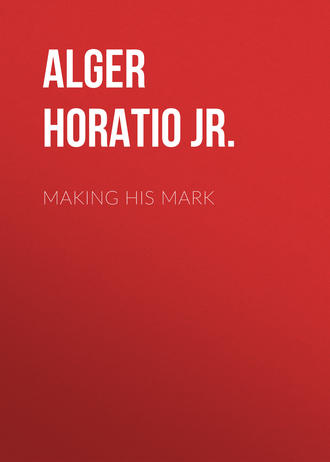
Alger Horatio Jr.
Making His Mark
CHAPTER XXVIII
A TRIP ON HORSEBACK
Three months passed and found Gerald still in his new home. There were no striking incidents during this time, but in a quiet way Gerald had effected a good deal in the way of change and improvement. The house was provided with new comforts, a safe had been sent from Helena, in which Thomas Nixon kept securities and valuable papers, a good deal of correspondence was carried on, Gerald acting as private secretary. Meals were no longer sent in from the boarding-house, but a young Swedish woman was engaged as servant and housekeeper. In short, Mr. Nixon was beginning to live like other people.
To Gerald the most important event was the purchase of a horse for his use. At that time railroad facilities hardly existed in Campville, walking was difficult and fatiguing over the rough hills of Montana; and in traveling about for his employer Gerald found a horse of great service. He at any rate was in a position to contradict the statement that Thomas Nixon was a miser, for the old man repeatedly offered him money outside of his salary, but thus far Gerald had declined with thanks.
One day Gerald brought back a letter from the morning mail, which Mr. Nixon read with thoughtful interest.
"I may have to send you on a journey, Gerald," he said.
"All right, sir."
"This letter is from the superintendent of a gold mine in Ransom, seventy-five miles from here. I own a half interest in the mine. He writes me that the output for the last six months has been falling off, and that the value of the mine has greatly depreciated. He ends by offering twenty thousand dollars for my share."
"Why should he want to buy it if the mine is falling off so largely?"
"That is what occurred to me. He closes by inviting me to go on and investigate for myself. He knows that I should not be likely to accept the invitation as my health is not sufficiently good."
"Did the superintendent offer to buy for himself?"
"He intimated that there was a man from New York whom he could induce to buy. I presume by a misrepresentation of the paying qualities of the mine."
"That would be a fraud," said Gerald.
"Certainly, and I don't care to defraud anyone."
"What did you regard as the value of your half of the mine?"
"At least thirty-five thousand dollars."
"Whatever I can do for you in this matter, Mr. Nixon, I shall be glad to do."
"I will send you to Ransom, not as representing me, but on a visit of investigation. Look about you, find out what you can, and report to me."
"I hope I shall be able to acquit myself to your satisfaction."
"At any rate, I have great confidence in you, and shall be guided by your report."
"Is Ransom far from here?"
"About seventy-five miles. The way to it is across country, and at times the traveling may be rough."
"Oh, I can rough it," said Gerald, cheerfully. "Won't the superintendent be surprised at your not answering his letter?"
"I shall answer it. I will write that I will take his offer into consideration—that in a matter of such importance I cannot decide at once. I will also add that it is doubtful whether I can go to Ransom on account of my health, but he can write me any further information that he thinks may interest me. I will also give you a paper stating that you represent me, but that is not to be used unless it seems expedient."
"Yes, sir, I understand. Have you any further instructions? When do you wish me to start?"
"As soon as you can get ready. I will make out a list of places along the route for your guidance. I would let you ask Mr. Loche for directions as to the course you are to take, but it might leak out where you had gone."
"I shall find the place, sir. I am a Yankee, and can ask questions."
"Take what money you need. I leave that to your discretion."
"You put great trust in me, Mr. Nixon."
"Well, young as you are, you are my right-hand man. Mr. Nugent could have done me no greater favor than by sending you to me."
On the afternoon of the second day Gerald found himself riding up a rocky incline, probably fifty miles on his way. There was no other traveler in sight. This had been his experience much of the way. Through the clear atmosphere, however, he could see some scattered buildings, betokening the presence of a village three or four miles away.
"I wish some one would come along," thought Gerald. "I haven't seen a face for three hours."
Had Gerald foreseen in what way his solitude would be broken in upon, he would have hesitated to express such a wish.
Ten minutes later he heard a terrible roar, and, looking up quickly, turned pale with dismay, as he noted the approach of a huge lion advancing toward him at terrific speed.
He had never heard that lions were to be found in Montana, and his surprise was almost as great as his terror.
CHAPTER XXIX
NERO
There was no time or inclination on his part to speculate upon such an extraordinary appearance. He felt that his life was in peril, and he must consider at once whether there was any chance of his saving it.
He was armed with a rifle, which thus far he had had no occasion to use. He was not unskilled in the use of firearms, and luckily the rifle was loaded. To use it seemed to be his one chance of safety.
When his horse espied the lion he seemed almost paralyzed with terror. If the lion had no other claim to be called king of beasts, the terror which he inspires in all other animals might be taken for a strong evidence of his royal supremacy. The horse stood stock still, and it seemed to Gerald that he would remain so till the lion came up. This being the case, he thought it best to slip off the horse's back and jump to the ground. It was this act of his, perhaps, that startled the horse into life and motion. At any rate he set out on a wild run, attaining a pace probably unprecedented in his history. The animal could not have rendered his rider a better service. Hitherto the lion's attention had been divided between the horse and the boy. Now that he saw the horse in rapid flight, the hunting instinct came to him. More than one have testified that when they saw a person or animal running they were seized with an impulse to follow. This was the case with the lion. Apparently he did not notice Gerald, but, swerving from his course, set out in pursuit of the horse.
When Gerald noted the fortunate turn that matters had taken, he breathed a sigh of deep-felt relief. But his relief was only temporary. It might not be long before the lion would overtake and kill the horse. Then, inflamed by the sight of blood, he would probably turn back and pursue the rider.
What could Gerald do?
He turned his eyes toward the distant town. Probably it was only three miles away, but it might almost as well have been three hundred. Yet to reach it was his only hope of safety.
He turned and ran toward the town as fast as his legs could carry him. He soon became scant of breath. The high elevation helped to make him so. Probably the excitement, too, had its effect.
He had no means of knowing whether the lion had caught up with his intended victim. Gerald fervently hoped not. The longer the horse could hold out, the more time he had to get away. He hardly dared to look, for he felt that even this might take time and so delay him.
He did look up, however, and, to his infinite relief, he discovered that a horseman was speeding toward him from the town.
He stood still and waited.
The man stopped his horse when he saw Gerald, and asked: "Boy, have you seen a lion hereabouts?"
The speaker had long hair, and wore a large sombrero, after the fashion of Buffalo Bill.
"Yes," answered Gerald, as soon as he could get his breath. "I am running away from him."
"But where is he?"
"In pursuit of my horse."
"But why are you not on your horse? Did he throw you?"
"No; I slipped off his back, and he started off in wild terror, the lion in pursuit."
"That probably saved your life."
"But how does a lion happen to be in this territory?" asked Gerald, in curiosity. "I never heard that lions were to be found in Montana."
"Nor are they. This lion belongs to a circus. He escaped only half an hour ago, and I am in pursuit of him."
"Are you connected with the circus?"
"Yes. My brother and I own it. We want to recover the lion, for he cost us a large sum of money."
"But suppose you meet him—won't you be in danger?"
"No. Any one else would; but I am his keeper, and he is afraid of me."
Gerald looked at him in curiosity. He could not understand how any one could gain such power over a lion.
"In what direction did the lion go?"
Gerald pointed eastward.
"I suppose, then, there is nothing to do but wait till he comes back."
"I would rather not wait. You may have power over the lion, but I have not."
"Then you can push on to the village; I will wait here."
"How far is it?"
"Rather more than a mile."
"But if the lion should overtake me, I should be in a bad case."
"I'll tell you what you may do. You may take my horse, and I will stay here. Go to the hotel and say that I sent you."
"What name shall I use?"
"King. I am Paul King, and I belong to King Brothers' Circus."
"I don't like to deprive you of your horse."
"It is of no consequence. If Nero comes back I can meet him just as well alone."
"Do you think he will come back?"
"Aye. Look!" he added, with excitement, "there he is!"
CHAPTER XXX
THE CIRCUS
Speeding toward them came the big beast, lashing his sides with his tail, evidently in a state of great excitement. Gerald trembled as he saw him. There are few, whatever their courage, who would not do so. He did not dare to set out on the way to the village. He thought it better to remain with the lion's keeper and under his protection.
Paul King stood calm and imperturbable, waiting the arrival of his lost charge. There was a time when he, too, would have fled, but he had become used to lions and their ways, and felt perfect confidence in his power to subdue them.
As Nero came nearer, Gerald could see that his jaws were bloody. He guessed that the blood was that of his ill-fated horse.
"He has killed your horse, sure enough," said King. "Was he valuable?"
"I paid a hundred dollars for him."
"He wasn't insured against lions?"
"No."
"I am sorry for your loss."
"I shall not mind that if I save my own life."
"Your life is in no danger."
By this time the lion was almost upon them. He looked terrible, with the blood-stains about his jaws, but Paul King's equanimity was not shaken. One thing, however, he failed to consider, and that was the effect of blood upon the savage brute. Great as was his ascendency over Nero, the savage instinct of the great animal destroyed the effect of years of discipline.
Paul King understood this when Nero advanced upon him, unheeding his tone of command.
"Down, Nero!" he cried; but Nero would not down. His wicked eyes glared, his tail lashed his sides, and he rushed at his keeper with hostile intent.
It flashed upon King that Nero was becoming dangerous.
"I shall have to kill you!" he cried, between his set teeth.
He fired at the lion, but either the huge animal swerved or something affected his aim, for it did not hit the mark.
Then Gerald thought it was time for him to act. His life as well as the keeper's was in peril. Raising his weapon he took steady aim.
"Shoot him in the eye!" exclaimed King.
Gerald obeyed, directions. As a boy, of course, he was not a practised marksman; but luck—or perhaps it would be better to say Providence—was on his side, and the bullet entered Nero's eye and penetrated to his brain. The lion swayed a moment, and then fell over on his side. Death seemed to be instantaneous.
"By Jove! you have killed him!" exclaimed Paul King. "It was a fine shot!"
"Is he really dead?" asked Gerald, finding it difficult to believe in his success.
"Yes, he is dead fast enough. He is dead, and the circus is out nearly five thousand dollars."
"That was better than to have him kill either of us."
"You are right. I never knew Nero in such a mood. It must have been the horse's blood that excited him."
"Have you any other lion in the show?"
"Yes, one; but this was the best."
"Shall you leave him here?"
"I will send out some of my men to bury him. He was a grand beast, and deserves burial. And now let us be going back."
"I will get off the horse and leave him to you," said Gerald.
"No; since my lion killed your horse, it is only fair that you should ride on mine. To be sure you killed the lion."
"I feel proud of it. I never expected to kill a lion."
"You have reason to be proud. You are the only boy I ever knew that could say as much."
Though Goldwin was a small town, a circus performance was given there during the evening. Five miles away was a mining station, and some seventy-five miners were in attendance. Gerald was glad to go, partly because it filled up his evening agreeably, and partly from the taste for such performances which he had in common with most boys of his age.
It was a small show, but Goldwin had never had a visit from Barnum or Forepaugh, and vociferously applauded the clown, the bareback riders, the trapeze performers, and other acts familiar to the regular circus goer.
In cages, in full view of the audience, were a few animals, including a Bengal tiger and a lioness. Paul King, Gerald's acquaintance of the afternoon, described these in succession. When he came to the lioness, he said: "I am sorry not to be able to show you the lion Nero, one of the finest specimens ever imported from Africa. He has been connected with our show for five years, but this morning he escaped and started out on a jaunt across country. He nearly killed a boy, who slipped off his horse and left the lion to chase the unfortunate animal. He overtook and tore the horse to pieces, and then started on his return.
"I had gone out in search of him, having confidence in my power over him. But I was mistaken. The blood which he had tasted roused his savage nature, and I was compelled to use my gun. But by bad luck I failed, and should myself have fallen a victim, but for the boy who had joined me and shot him in the eye, instantly killing him.
"I cannot show you the lion Nero, but I am able to show you the boy who killed him, the only boy within my knowledge who ever killed a lion."
He signaled, to Gerald, who rose from his seat, flushed and bashful. The whole audience, and especially the miners, cheered him loudly. Gerald bowed his acknowledgment and sat down.
When the performance was over more than one went up to Gerald and shook his hand. Among them was a tall, slabsided Yankee, who closely resembled the pictures of Uncle Sam.
"I tell you, boy, you're true grit," he said; "take the word of Joshua Burdoch for that. I've shot a panther, but I own I shouldn't dare to tackle a lion."
"It was a case of necessity," said Gerald, smiling. "Either I must kill him, or he would have killed me."
"Weren't you afraid?"
"Yes, I was."
"I think better of you for saying so. Some would have denied it and said they were perfectly cool."
"I hope I shall never meet another lion," said Gerald. "I am satisfied with killing one."
"Where are you going when you leave here?"
"To Ransom."
"So am I. Suppose we hitch horses?"
"I shall be very glad of your company, Mr. Burdoch; but, as to hitching horses, I shall have to buy one first. The poor animal I came on was killed by Nero."
"You can buy one in town, and if you need money I will lend you some."
"There won't be any trouble about that. I am well provided."
Gerald was pleased to have secured as companion, an honest man whom he could trust. Moreover, in case of danger or difficulty, he felt that he could rely on Joshua Burdoch for help.
CHAPTER XXXI
RANSOM
Gerald purchased a horse, and kept on his way to Ransom with Joshua Burdoch. After some reflection he told his Yankee friend his business. The latter promised him his assistance if required.
"That man, the superintendent, is a crafty old fox," he said. "Between us we must circumvent him. What is his name?"
"Nelson Hawk."
"When we get to Ransom we must make inquiries and learn all we can before acting. It seems to me it is rather a heavy responsibility for you!"
"So it is, and I am glad to have your advice and assistance."
"It will be fun for me to outwit the old fox!"
They speedily reached Ransom. It was entirely a mining town. The houses of the miners, with the hotel and store, constituted the town. Gerald stayed at the hotel, which he found a fair one for such a place. His room and Mr. Burdoch's joined. If Mr. Burdoch had any business he did not mention it, except to say that he had a few dollars, and might invest if he found anything worth buying.
Among the boarders at the Ransom House was a small, thin, shriveled man, with a wrinkled face and a pair of sharp, crafty eyes, whose name on the register was Matthew Grote. He appeared to have money, and it was currently reported that he wanted to make an investment.
On the evening of their arrival, Nelson Hawk, the superintendent of the mine, called, and, taking a seat in the public room, began to converse with Grote. Gerald conjectured that this must be the man who wanted to buy the mine. He sat down about ten feet from the pair, and appeared to be absorbed in a paper which he had picked up in the office. Grote and Hawk had no suspicion that the boy, whom they considered of small importance, was a listener to their conversation, and spoke in their ordinary tone of voice.
"Have you heard from old Nixon, Mr. Hawk?" asked Grote.
"Yes. I received a letter yesterday."
"What does he say?"
"That he can't come on. His health will not admit of it."
"Will he sell you his interest?"
"He says he will take the offer into consideration, and will let me know soon."
"I wish the old crank would hurry up. Does he express any doubts about your statements as to the depreciation in value?"
"No. Why should he? He knows nothing about it except what I tell him."
"But suppose these stories should be true?"
"What do you mean?"
"That the mine is falling off in the amount of its output."
"My dear sir, you are not in earnest. Why, the mine was never in better condition than at present. Our output last month was greater than ever before. A half share is well worth the forty thousand dollars I require. Why, if you buy you can make fifty per cent. in one year. I can almost guarantee that."
"Why, then, are you willing to sell your share?"
"Because I want to divide the responsibility. Besides, I am short of ready money. I should like, if I get hold of Nixon's share, to sell the whole thing for seventy-five thousand dollars. I am tired of this country, and I want to go back to my Eastern home."
"Well, we will see. I might make up my mind to buy the entire mine if I find that your statements are correct. How soon do you think Mr. Nixon will make up his mind?"
"Very soon. If not, I will write him again."
"The sooner the better."
Here the twain parted. Gerald had heard all that he needed. He saw that a stupendous fraud was contemplated, of which Mr. Nixon was to be the victim. Hawk had offered him twenty thousand dollars for his half interest, and agreed conditionally to sell it to Grote for forty thousand. This would give the superintendent a very neat profit.
Mr. Burdoch had not heard this conversation. Had he been within hearing, they would have been more careful in their speech. As to Gerald, they looked upon him as a mere boy, and did not feel it necessary to be on their guard.
Gerald, however, lost no time in imparting the information he had obtained to Mr. Burdoch.
"The confounded rascal!" exclaimed the Yankee. "He has got up a very pretty scheme for fleecing your employer. So he says the mine is doing well?"
"Never better. He says a half interest is well worth forty thousand dollars."
"Humph! It may be worth looking up. I might decide to buy the mine myself."
Gerald regarded his companion with surprise. He had not looked upon him as a rich man, but thought he might be worth one or two thousand dollars.
"Do you really mean it?" he asked.
"Certainly I do."
"I did not suppose–" Here Gerald hesitated.
"Oh, I see—you didn't think I had money enough. Well, Gerald, I don't mind telling you I could buy two such mines as this one here. I ain't no dude, but I've got the gold."







